exercise

Another Reason to Challenge Yourself at the Gym
Alara Tuncer | May 16, 2024 | 4 min read
In a chronic stress model, challenging exercise reduced anxiety by activating a three-neuron loop across brain regions.
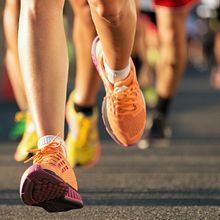
How Exercise Sparks, then Soothes, Inflammation
Rachael Moeller Gorman | May 15, 2024 | 4 min read
Regulatory T cells in muscles surge after exercise, quelling inflammation, protecting mitochondria, and enhancing performance.

What Happens to Muscles During Exercise?
Mariella Bodemeier Loayza Careaga, PhD | Jan 1, 2024 | 2 min read
Exercise changes our muscles, but its molecular effects depend on the type of exercise.
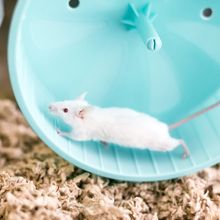
An Exercise-induced Liver Enzyme Boosts Metabolism
Natalia Mesa, PhD | Jul 7, 2023 | 3 min read
Exercise drives the liver to produce the CES2 enzyme, which circulates in blood and delivers some of the benefits of exercise in mice.
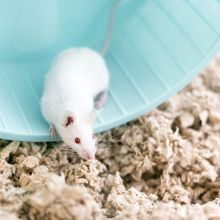
Mice With a Healthy Gut Microbiome Are More Motivated to Exercise
Katherine Irving | Dec 16, 2022 | 4 min read
A neural pathway between the gut and the brain led to the release of dopamine when the mice ran on a wheel or treadmill, but only in the presence of a robust microbiome.

How Exercise Helps Mice Fight Pancreatic Cancer
Dan Robitzski | Jun 15, 2022 | 5 min read
A study reveals a molecular pathway linking exercise to an amped-up immune response to pancreatic cancer and greater responsiveness to treatment.

Exercise-Associated Protein Boosts Brain Function in Mice
Chloe Tenn | Dec 9, 2021 | 5 min read
A study that transfused plasma from active to inactive mice suggests the protein clusterin enhances cognition.
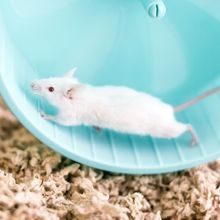
Putative Exercise Hormone Irisin Boosts Mouse Brainpower
Sophie Fessl, PhD | Sep 10, 2021 | 4 min read
Mice lacking irisin didn’t exhibit the cognition improvements that typically follow exercise, and in mouse models of Alzheimer’s disease, treatment with the hormone reduced cognitive decline.
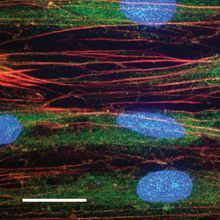
Mechanosensory Protein Helps Tendons Stiffen After Exercise
Catherine Offord | Sep 1, 2021 | 2 min read
Researchers identify a role for PIEZO1 in tendon adaptation, and show that people with certain versions of the Piezo1 gene tend to be better jumpers.

Exercising During Pregnancy Protects Mouse Offspring
Jack J. Lee | Aug 1, 2021 | 2 min read
Obese mice that exercised while pregnant gave birth to pups that grew up free of the metabolic issues present in the adult young of sedentary obese mothers—possibly by staving off epigenetic changes to a key metabolic gene.
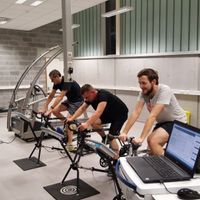
Regular HIIT Exercise Enhances Health via Histamine
Rachael Moeller Gorman | Apr 21, 2021 | 4 min read
Men given high doses of two antihistamine drugs did not experience the same benefits of high intensity interval training that men on a placebo enjoyed, revealing some of the molecular underpinnings of exercise’s effect.
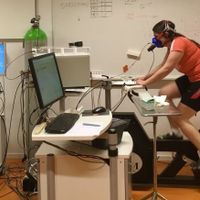
Extreme Exercise Carries Metabolic Consequences: Study
Shawna Williams | Mar 23, 2021 | 4 min read
Healthy people put through high-intensity interval training, or HIIT, displayed insulin resistance and mitochondrial dysfunction after working out excessively.
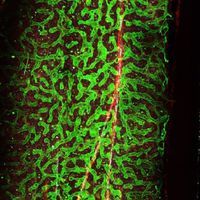
Impact of Running Reaches Marrow to Spark Bone Growth in Mice
Emma Yasinski | Mar 2, 2021 | 3 min read
A study offers a new explanation for how exercise strengthens bones and the immune system.
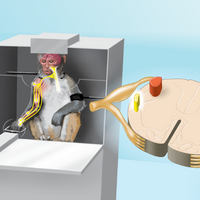
Infographic: How Weight Lifting Changes Monkeys’ Neural Connections
Jef Akst | Oct 1, 2020 | 1 min read
After weeks of training, the muscles of two macaques exhibited greater responses to stimulation of the reticulospinal tract in the brain stem than they had before, suggesting that strengthening the neural pathway is key to getting stronger.
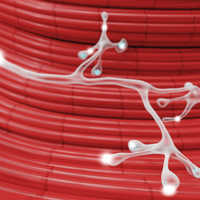
Neural Connections Bolstered in Monkeys That Lift Weights
Jef Akst | Oct 1, 2020 | 3 min read
A study in two macaques reveals the importance of increasing connectivity between muscles and the reticulospinal tract that runs from the brain stem down the spinal cord.

Blood Transplants from Active Mice Give Brain Boost to Others
Lisa Winter | Jul 12, 2020 | 2 min read
The researchers behind the results propose that an exercise-induced protein in circulation is responsible for the benefits.

Contributors
The Scientist | Apr 1, 2020 | 4 min read
Meet some of the people featured in the April 2020 issue of The Scientist.

Regular Exercise Helps Patients Combat Cancer
Bente Klarlund Pedersen | Apr 1, 2020 | 10 min read
Studies point to a role for physical activity in fighting malignancies, improving treatment outcomes, and fostering overall health in patients.
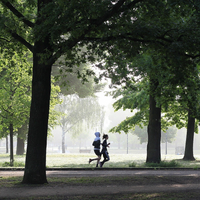
Can Exercise Explain the Health Benefits of Natural Environments?
Emily Makowski | Jan 3, 2020 | 4 min read
Researchers found that people who spend more time outdoors also spend more time being active and socializing, but it probably doesn’t account for all of the health boost associated with green spaces.
